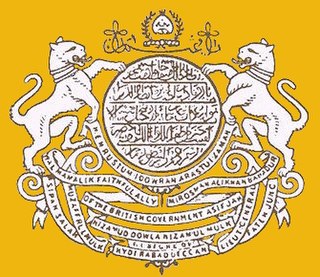
Nizam of Hyderabad was the title of the ruler of Hyderabad State. Nizam is a shortened form of Niẓām ul-Mulk, which means Administrator of the Realm, and was the title bestowed upon Asaf Jah I when he was appointed Viceroy of the Deccan by the Mughal Emperor Farrukhsiyar. In addition to being the Mughal Viceroy (Naib) of the Deccan, Asaf Jah I was also the premier courtier of the Mughal Empire until 1724, when he established the independent monarchy of Hyderabad and adopted the title "Nizam of Hyderabad".

Asaf Jah VI, also known as Sir Mir Mahboob Ali Khan Siddiqi, was the sixth Nizam of Hyderabad. He ruled Hyderabad State, one of the princely states of India, between 1869 and 1911.

Mir Osman Ali Khan, Asaf Jah VII was the last Nizam (ruler) of the Princely State of Hyderabad, the largest state in the British Indian Empire. He ascended the throne on 29 August 1911, at the age of 25 and ruled the State of Hyderabad between 1911 and 1948, until India annexed it. He was styled as His Exalted Highness (H.E.H) the Nizam of Hyderabad, and was widely considered one of the world's wealthiest people of all time. With some estimates placing his wealth at 2% of U.S. GDP, his portrait was on the cover of Time magazine in 1937. As a semi-autonomous monarch, he had his mint, printing his currency, the Hyderabadi rupee, and had a private treasury that was said to contain £100 million in gold and silver bullion, and a further £400 million of jewels. The major source of his wealth was the Golconda mines, the only supplier of diamonds in the world at that time. Among them was the Jacob Diamond, valued at some £50 million, and used by the Nizam as a paperweight.
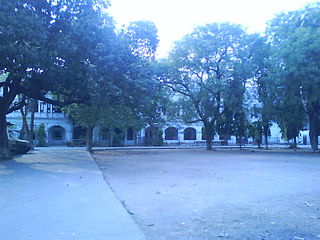
Purani Haveli, also known as Masarrat Mahal palace, is a Haveli located in Hyderabad, Telangana, India. It was the official residence of the Nizam. It was also known as Haveli Kadeem, which means old mansion, was constructed for Sikander Jah, Asaf Jah III (1803–1829) by his father Ali Khan Bahadur, Asaf Jah II.

Paigah family was a noble family from the former Hyderabad State. The family maintained their own court, individual palaces, and a standing army of about fourteen thousand infantry and cavalry troops.
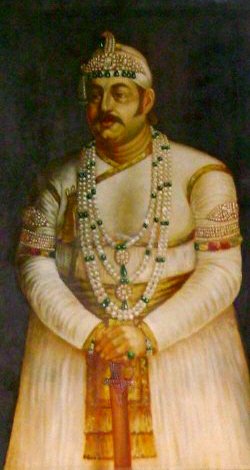
Afzal ad-Dawlah, Asaf Jah VMir Tahniyat Ali Khan Siddiqi was the eighth Nizam of Hyderabad, India, from 1857 to 1869.
Nawab Sir Ahmed Hussain, Amin Jung Bahadur, KCIE, CSI, LLD (Osmania), MA, BL (Madras) was born in Madras on 11 August 1863 in the family of a leading businessman.

The Hyderabad Race Club is a thoroughbred racing association and the race track is at Malakpet, Hyderabad, Telangana, India. This race course is considered one of the top racecourses in India and was inaugurated by the 6th Nizam Mahbub Ali Khan.

Saroornagar is a neighbourhood in Hyderabad. It is located in the Rangareddy district of Indian state of Telangana. It is located in Saroornagar mandal of Kandukur revenue division.

King Kothi Palace or Nazri Bagh Palace is a royal palace in Hyderabad, Telangana, India. It was the palace where the erstwhile ruler of Hyderabad State, Sir Mir Osman Ali Khan, the seventh Nizam, lived. It was a palace bought by his father Mahboob Ali Pasha, who had a penchant for buying ostentatious homes.

The Asaf Jahi was a Muslim dynasty that ruled the Hyderabad State. The family came to India in the late 17th century and became employees of the Mughal Empire. They were great patrons of Indo-Persian culture, language, and literature, and the family found ready patronage.
Malakpet is one of the neighbourhoods in the old city area of Hyderabad, Telangana, India. This is further divided into two parts, Old Malakpet and New Malakpet and is traditionally considered part of old city. This circle (6) comes under Charminar Zone of Greater Hyderabad Municipal Corporation. There are seven wards in this circle namely Saidabad (24), Moosrambagh (25), Old Malakpet (26), Akberbagh (27), Azampura (28), Chawani (29) and Dabeerpura (30).

Sir Viqar ul-Umara, Iqtidar ul-Mulk, Iqbal ud-Dowla, Secundar Jung, Nawab Muhammad Fazl-ud-din Khan Bahadur, was the Prime Minister of Hyderabad State from 1893 to 1901, and also served as the Amir-e-Paigah from 1881 to 1902.

His Excellency Amir e Paigah Basheerd-Ud-daula Azam-Ul-Umra Amir-e-Akbar Nawab Sir Muhammad Mazharuddin Khan Bahadur Rifa’at Jang, commonly known as Sir Asman Jah or Nawab Sir Asman Jah Bahadur, Asman Jah was one of those fortunate individuals to whom it has been given by fate to write their names large in the annals of their country, he was an Indian noble and member of the Great Paigah Family who served as Prime Minister of Hyderabad from 1887 to 1894. As the grandson of the premier noble Fakhr Uddin Khan Amir e Kabir Shams-ul-Umra I and of a princess of the blood, his social position was a great one; but the personal qualities he possessed, inherited largely from his grandfather, were unquestionably the means of bringing him to the front. Singularly gifted by nature as far as the outward man was concerned and excelling in all manly pursuits, he easily took the lead among his peers. But it was his mental and moral equipment which attracted the notice of his royal master while yet the young noble was in early manhood. Such was the promise he showed that His Highness the Afzal-ud-Daulah gave him his daughter in marriage and bestowed on him the highest distinction in his gift, the title of Jah.in 1869, Asman Jah entered on his public career as Minister of Justice. A little later on, while still retaining the portfolio of Justice, he acted as Prime Minister and co-regent. Later still he became a Member of the Council of Regency, and finally in 1887 he was appointed Prime Minister and continued to hold the office till 1893. In this connection it may be noted that throughout his long official career, Sir Asman Jah refused to take any salary while willing to take office he steadily persisted im refusing the emoluments of office. Elis regime as Premier was marked by several reforms, notably the advance made in education, the extension of medical aid by the State, especially aid to women, and the establishment of a permanent Board of Irrigation and city water supply, which has since been of excellent service to the State, Asman Jah was still in London when he got the news of his having been-appointed Prime Minister and one of the first to congratulate him on his appointment was his late Majesty King Edward VIL, then Prince of Wales, Asman Jah built several architectures throughout the city like Asman Garh Palace, Basheer Bagh Palace, saroonagar palace and Mahboob Chowk Clock Tower. Just before he was appointed to the premiership he was deputed by His Highness the late Nizam, Mahboob Ali Khan, to proceed in 1887 to London as his representative at the Golden Jubilee of Her late Majesty Queen Victoria. While in England he won golden opinions by the tact, savoir faire and high breeding he displayed His handsome presence, imposing address and polished manners impressed all classes of English Society and he became a great favourite in court circles. Indeed, the late Nizam could not have had a more dignified or worthier representative.
Mahbūb Mahboob(also spelled Mahboob, or Mehboob, from Arabic: مَحبُوب, passed to other languages such as Urdu: محبوب is a masculine given name.

Saifabad Palace was a palace in the city of Hyderabad, Telangana, India. Built in 1885 by Mahboob Ali Khan, the sixth Nizam of Hyderabad, it served as the seat of government for various Indian states until its demolition in 2020.

The Old City of Hyderabad is a walled city of Hyderabad, Telangana, India, located on the banks of the Musi River built by Qutb Shahi sultan Muhammed Quli Qutb Shah in 1591 AD. There used to be a wall surrounding the Old City, most of which is destroyed. Mubariz Khan, the Mughal governor of Deccan Subah, had fortified the city in 1712 and was completed by Nizam of Hyderabad.
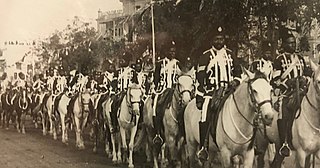
A. C. Guards is a locality in the city of Hyderabad, Telangana. The name A.C Guards came from the African Cavalry Guards of Hyderabad State who were stationed there since the time of sixth Nizam, Mahbub Ali Khan, Asaf Jah VI.
The localities and neighborhoods of Hyderabad have unique oral histories, dating to the time of the Qutb Shahi dynasty, over 400 years ago, and are named after various people and things. Some are named after a major building or structure in the locality, others named for individuals. The names are mostly in Telugu and Urdu, the major languages of the city. This is a list of localities, neighborhoods and streets of Hyderabad and their etymology.
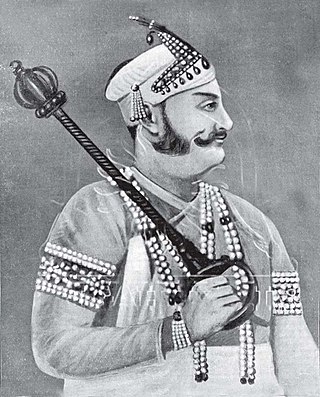
Nawab Muhammad Abu'l Fateh Khan Bahadur, Taigh Jang Bahadur was an Indian nobleman and founder of the House of Paigah. He was also known as Abu'l Khair Khan II and conferred with the titles Shams ul-Umara, Shams ul-Mulk, Shams ud-Daula, and Imam Jung III.


















